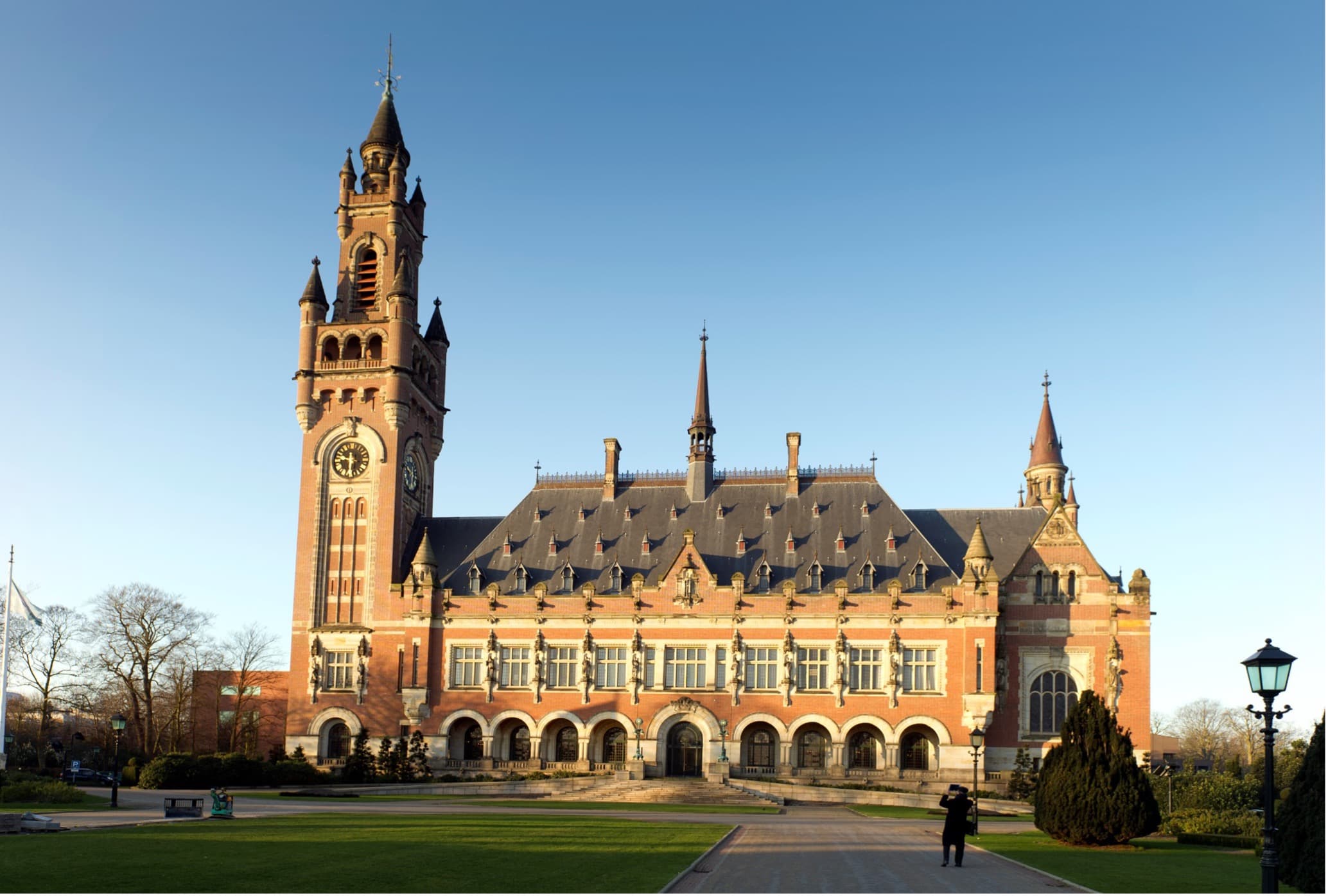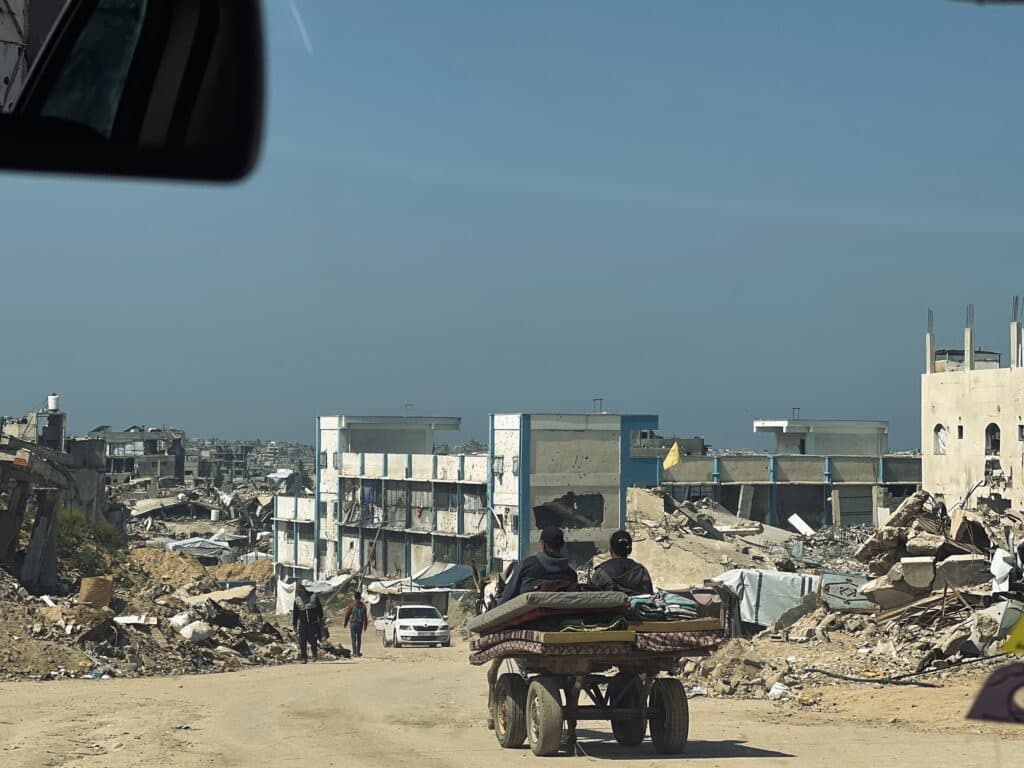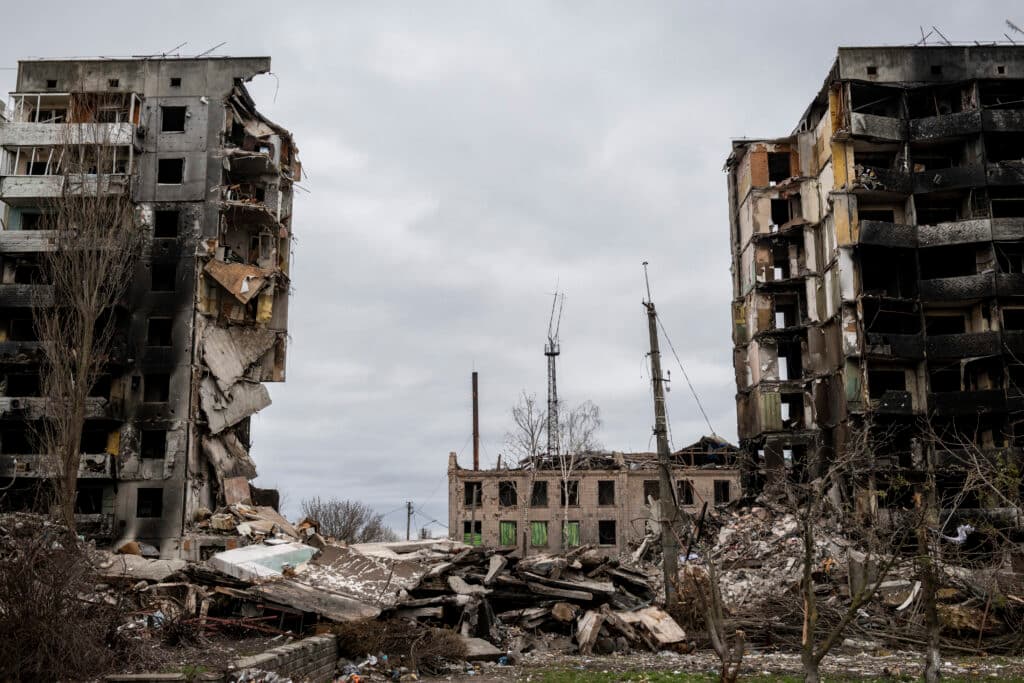
The Forthcoming ICJ Advisory Opinion and the Question of Palestine
3 July 2023On 30 December 2022, the plenary of the United Nations (UN) General Assembly adopted a resolution requesting an advisory opinion from the International Court of Justice (ICJ) on the Legal Consequences arising from the Policies and Practices of Israel in the Occupied Palestinian Territory, including East Jerusalem.
The specific questions that the Court has been asked to address in its advisory opinion concern some of the most fundamental points of contention regarding Israel’s indefinitely prolonged occupation of Palestinian territory.
First, the Court has been asked to assess the legal consequences arising, respectively, from Israel’s:
- Ongoing violation of the right of the Palestinian people to self-determination;
- Prolonged occupation, settlement and annexation of the Palestinian territory occupied since 1967, including measures aimed at altering the demographic composition, character and status of the Holy City of Jerusalem; and
- Adoption of related discriminatory legislation and measures.
Second, the Court has been asked to ascertain:
- How the policies and practices of Israel referred to above affect the legal status of the occupation; and
- What legal consequences arise for all States and the UN from this status.
Unlike the ICJ’s judgements in contentious cases, which are binding on the parties to the dispute, the Court’s advisory opinions are not legally binding and serve instead to provide legal advice to the UN organs and institutions requesting them. Be that as it may, as the principal judicial organ of the UN, the ICJ’s prestige and authority are such that its advisory opinions do nevertheless carry considerable weight. Indeed, the interpretations of international law presented in such opinions are likely to influence how the law will be understood and applied by a range of key actors including States, other courts (both domestic and international), and international organizations. Accordingly, the answers that the ICJ will eventually provide to the questions in the case under discussion could have significant implications with respect to the Israeli-Palestinian context and are likely to have repercussions for other situations of belligerent occupation as well.
With this in mind, the Diakonia IHL Centre Jerusalem devoted the fourth session of its event series Reflections on International Law and the Question of Palestine, which took place on 14 June 2023, to the forthcoming advisory opinion. The event featured contributions from three expert speakers, each of whom concentrated on a different item from the list of questions before the Court.
A recording of the event, followed by a summary of the discussions, is available below. All publications on the advisory proceedings are listed here, and a research page on legal proceedings relating to Israel and the oPt can be found here.
The Palestinian people’s right to self-determination
Professor Susan Akram, who is a Professor of Law at Boston University, focused her intervention on the Palestinian people’s right to self-determination. She observed that any related enquiry – including the one to be conducted by the ICJ in its advisory opinion – should not be limited to Palestinians residing in the occupied Palestinian territory (oPt), and instead requires considering the situation of the entire Palestinian people, throughout historical Palestine and the Palestinian diaspora.
Professor Akram first noted that self-determination is the right of all peoples to pursue their economic, social, and cultural development, and to determine their political status freely, without external interference. While UN General Assembly resolutions 1514 and 1541 of 1960 – the former titled “Declaration on the Granting of Independence to Colonial Countries and Peoples” – link self-determination to decolonization, it is not clear in the Palestinian case who are the people(s) of Palestine to whom the right to self-determination attaches as rightsholders.
For purposes of clarification, Professor Akram then presented a short survey of the legal history of Palestinian nationality. She contended that – as a matter of international law – Palestinian nationality was first formed with the entry into force of the Treaty of Lausanne on 6 August 1924, which awarded Palestinian citizenship to all Ottoman citizens residing in the territory of Palestine. It was further codified under British law during the Mandate period. In Professor Akram’s view, this codification of citizenship was in line with international law as it stood at the time, attaching citizenship to a population that was genuinely and intrinsically linked to a defined territory with specified borders and passed through blood, residence, or birth on the territory. Professor Akram insisted that UN General Assembly resolution 181 of 29 November 1947 (the “Partition Plan”) did not change the status of Palestinian nationality; rather, it encompassed the proposition that Palestinian citizens residing in the Arab State would become citizens of the Arab State, while Palestinian citizens residing in the Jewish State would become citizens of the Jewish State, irrespective of religion. Furthermore, far from authorizing either State to institutionalize superior rights for any racial or religious group, under the Partition Plan both States were to adopt constitutions protecting the rights of their respective minorities.
Professor Akram went on to note that after the declaration of the State of Israel in 1948, the Israeli government adopted a series of laws that permanently affected Palestinians’ legal connection to their homeland, such as the 1950 Law of Return and the 1952 Nationality Law, with the latter retroactively repealing Palestinian nationality as codified under British law. To this day, these two laws form the basis of the two-tiered system according to which Jews are nationals of Israel and can automatically become citizens, while non-Jews can become citizens but can never become nationals, and hence are denied the privileges associated with Jewish nationality.
In Professor Akram’s view, the 1950 Law of Return and the 1952 Nationality Law violated fundamental customary law principles, and as such did not void Palestinian nationality as established under the Treaty of Lausanne. Therefore, Palestinian refugees and Palestinians claiming nationality dating from 1924 and through subsequent generations have an absolute right as nationals to return to their place of origin.
Discrimination and apartheid
Dr Munir Nuseibah, Assistant Professor of Law and Director of the Human Rights Clinic at Al-Quds University, spoke about the question of discrimination that was put before the ICJ, and about the related matter of apartheid. He asserted that while many of the inhumane acts constitutive of apartheid – including those explicitly mentioned in the General Assembly resolution requesting the advisory opinion, such as “prolonged occupation, settlement and annexation of the Palestinian territory occupied since 1967” and “measures aimed at altering the demographic composition, character and status of the Holy City of Jerusalem” – are illegal in themselves, the advantages of the apartheid framework are twofold.
First, the apartheid framework provides for a more holistic analytical lens, in the sense that it does not treat recurring and systematic violations of international law in isolation, but rather identifies their common underlying intention and purpose. In Dr Nuseibah’s analysis, in the Palestinian-Israeli context Israel’s intention is to change the demographic composition with a view to ensuring Jewish superiority, both in the oPt and in the areas over which Israel claims full sovereignty. He maintained that this intention is reflected in a series of discriminatory laws contained in the separate legal systems enforced in the different areas under Israel’s control – Israel within its pre-1967 borders; East Jerusalem, to which Israel applies its own domestic law in violation of international law; the occupied West Bank; and the Gaza Strip. As such, an analysis grounded in the apartheid framework necessarily entails examining the root causes of rights violations and the ideology that drives them.
The second advantage of the apartheid framework, according to Dr Nuseibah, is that it prescribes a specific remedy that is not available for other violations of international law, namely the dismantling of apartheid. In the case of Palestine, this would mean the dismantling of discriminatory institutions, laws, and other measures imposed by Israel, in addition to the occupation itself.
While the request for an advisory opinion does not explicitly mention apartheid – rather, it refers to “discriminatory legislation and measures” implemented in the oPt – Dr Nuseibah concluded that it will be difficult for the Court to ignore this question in light of the plenitude of convincing reports and analyses that have been published in recent years, and a concomitant discursive shift in the human rights community.
Illegal occupation?
Dr Marco Longobardo, Reader in International Law at the University of Westminster, addressed the question of the (il)legality of the occupation as a whole and related consequences for third States and the UN.
Dr Longobardo observed that while there have been attempts to argue that an occupation may be rendered illegal under IHL – notably, in a 2005 paper by Orna Ben-Naftali, Aeyal Gross, and Keren Michaeli – in his view IHL is not the most suitable framework of analysis for such an enquiry. That is because IHL does not set a legality test for the occupation in itself; rather, it treats an occupation as a fact – albeit a transitory one – from which certain normative consequences emanate, i.e., rules of conduct addressed to the occupying power. Consequently, IHL prohibits certain specific measures such as the settlement enterprise or forcible transfers, but does not determine an “expiry date” after which the whole occupation becomes automatically unlawful.
Dr Longobardo went on to contend that an occupation may nevertheless be deemed to be illegal on the basis of other legal frameworks that govern situations of armed conflict including occupation. Thus, he maintained that it could be argued that Israel’s prolonged occupation of Palestinian territory is illegal because it contravenes the principle of self-determination of peoples. In this regard, he noted that the Palestinian people’s right to self-determination has been recognized by the international community time and time again, including in the 2004 Advisory Opinion on Legal Consequences of the Construction of a Wall in the Occupied Palestinian Territory.
Dr Longobardo further maintained that the prolonged occupation of Palestinian territory may be deemed illegal because it runs counter to the law on the use of force between States, the jus ad bellum, which requires a lawful purpose (i.e., self-defence against an actual or imminent armed attack by another State that has persisted from 1967 to the present), and compliance with the strict requirements of necessity and proportionality (in respect of any measures taken to repel the armed attack, including occupation of territory).
Turning to assess the legal consequences of a potential ICJ finding that the Israeli occupation of Palestinian territory is illegal, Dr Longobardo noted that Israel would have a duty to cease the unlawful act (i.e., to withdraw from the occupied territory); to offer assurances and guarantees of non-repetition; and to provide full reparation for injury (in the form of restitution, compensation, or satisfaction). Furthermore, the prohibition on the use of force and acquisition of territory by force (cornerstones of jus ad bellum) as well as the principle of self-determination of peoples constitute peremptory norms of international law, also known as jus cogens, from which no lawful derogation is permitted. Any serious violations of such norms – “a gross or systematic failure” to comply with the obligation in question – would entail consequences also for third States, which would have a duty not to recognize the unlawful situation as lawful, and to cooperate to bring the unlawful situation to an end, usually under UN auspices.
Looking ahead
The discussion reviewed here presented some of the viewpoints that are expected to feature in the debate around the advisory opinion, particularly with regards to the questions concerning the Palestinian people’s right to self-determination, discriminatory policies and practices, and the legal status of the occupation. These and the other questions before the ICJ will no doubt continue to be the subject of intense scrutiny for the duration of the proceedings, and even more so when the Court eventually issues its opinion.
Part of this debate will unfold through official submissions to the Court. In an order issued on 3 February 2023, the ICJ fixed 25 July 2023 as the time limit within which UN member States as well as the observer State of Palestine and authorized UN organizations may present it with written statements on the questions it has been asked to address in the advisory opinion. States and organizations that present written statements will then have until 25 October 2023 to submit written comments on the written statements made by other States or organizations. In addition to these official submissions, a wide range of actors will surely debate the advisory opinion via other channels.
As the discussion here partially illustrated, such debates – and certainly the advisory opinion itself – could have far-reaching consequences. For one thing, they could potentially influence the received interpretation of relevant provisions of international law to a significant degree. In turn – and notwithstanding counterpressure generated by extra-legal, political considerations – this could influence the practical application of the law, with meaningful implications for the Palestinian-Israeli context.
COVER PHOTO: OUTSIDE VIEW OF THE PEACE PALACE IN THE HAGUE (NETHERLANDS), IN FEBRUARY 2012. © CIJ-ICJ/UN-ONU, FRANK VAN BEEK - COURTESY OF THE ICJ.








